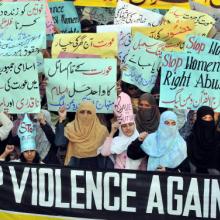honor killings
“Language matters. The use of the term ‘honour’ to describe a violent criminal act … can be explained only as a means of self-justification for the perpetrator. It diminishes the victim and provides a convenient excuse for what in our society we should accurately and simply call murder, rape, abuse, or enslavement,” Ghani said when introducing her crime-against-women bill Jan. 31.
“It is a thinly-veiled reference to stereotypes about Islam and Muslims,” said Daniel Mach, director of the American Civil Liberties Union’s Program on Freedom of Religion and Belief. “This reference to honor killings is part of a broader effort to smear an entire faith by the extreme acts of a few and its inclusion in this order bolsters the argument that this is simply another attempt at a Muslim ban.”
Some die for choosing, others for not choosing. But they all die because they are women. Rogers was mentally ill, and there is debate about whether it was his illness or a misogynistic culture that caused his rampage. For Farzana’s family, and for the 1000 Pakistani girls and women who die each year in the name of honor, there is no question.
On a summer night in a Western town of flat fields and hazy sunsets, a young woman stood outside a Greyhound bus with a ticket in her hand and a backpack over her shoulder. Boarding the bus, she said later, would be the hardest thing she had done in her 18 years.
Harder than saying a last goodbye to her mother, father, and five siblings that morning. Harder than the two years since as she tried to make a new life, alone, in a strange city.
Now 20, she asked to go by the name Samya. If her true identity were known, Samya believes, her family would seek her out and possibly kill her. They would certainly try to persuade her — if not force her — to come home.
Her parents, she said, think she is guilty of two serious crimes: She rejected a marriage arranged by her father, who came to the U.S. from the Middle East when Samya was an infant. And perhaps more serious to her parents: She has become an atheist.
TORONTO — Muslim clerics in Canada have issued a fatwa against so-called "honor killings" a week after three members of an Afghan family in Montreal were convicted of the murders of four relatives.
The religious decree -- only the third of its kind in Canada -- also prohibits domestic violence and hatred of women. It was issued on Saturday (Feb. 4) on the eve of Mawlid an-Nabi, the Prophet Muhammad's birthday.
"These crimes are major sins in Islam, punishable by the court of law and almighty Allah," said Imam Syed Soharwardy of Calgary, representing 34 clerics affiliated with the Islamic Supreme Council of Canada.
The recent conviction in Canada of Afghani-Canadian parents and son, in the highly-publicized legal case hinging on what has been described broadly as “honor killings,” has exposed the horrifically demented practice to public scrutiny.
Though the three defendants — Mohammad Shafia, his wife and son — denied responsibility for the death of Shafia’s three daughters and first-wife, the Canadian court decided otherwise.
Recordings presented during the trial included wiretaps in which Shafia called his dead daughters “treacherous” and “whores” because they dated boys and wore what Shafia considered to be suggestive clothing. When the verdict was announced, Ontario Superior Judge Robert Maranger determined that the murders of the four women —ages 13, 17, 19 and 52 — were, in fact, motivated by warped (some might say, rightly, “sociopathic”)ideology. As he ruled, Maranger said:
"It is difficult to conceive of a more despicable, more heinous crime. The apparent reason behind these cold-blooded, shameful murders was that the four completely innocent victims offended your completely twisted concept of honor.”
Mohammed Shafia’s distorted concept of honor is one that is shared by far too many around the globe. It says that the murder of women and girls — those ones who don’t play by the family rules — restores the honor the family has been deprived of by virtue of its female members’ behavior.
According to the Associated Press:
A jury on Sunday found three members of an Afghan family guilty of killing three teenage sisters and another woman in what the judge described as "cold-blooded, shameful murders" resulting from a "twisted concept of honor," ending a case that shocked and riveted Canadians.
Prosecutors said the defendants allegedly killed the three teenage sisters because they dishonored the family by defying its disciplinarian rules on dress, dating, socializing and using the Internet.
The jury took 15 hours to find Mohammad Shafia, 58; his wife Tooba Yahya, 42; and their son Hamed, 21, each guilty of four counts of first-degree murder. First-degree murder carries an automatic life sentence with no chance of parole for 25 years.
After the verdict was read, the three defendants again declared their innocence in the killings of sisters Zainab, 19, Sahar 17, and Geeti, 13, as well as Rona Amir Mohammad, 52, Shafia's childless first wife in a polygamous marriage.
Read a roundup of the ongoing coverage of the Shafia trial and the religious, political and social issues related to the so-called "honor killings" inside the blog...
Promoting gender equality is crucial to combating global poverty, a point Nicholas Kristof and Sheryl WuDunn make in their new book,





